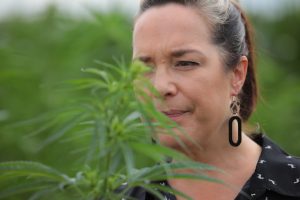
Wendy Mosher
To maintain growth, the booming U.S. hemp industry needs a reliable supply of steady, stable seed genetics.
Professional and academic plant breeders are rushing to fill the market demand, but it might take at least another five years to develop those genetics, according to longtime breeders.
That’s because it takes time to breed, trial and select new varieties and then build up the quantity of seed and clones needed to fulfill a growing supply chain.
Plant breeders are developing varieties with desired traits that will grow successfully in the many different climates and microclimates across the U.S.
Wendy Mosher, president and CEO of Fort Collins, Colorado-based breeding company New West Genetics, said the United States has a strong economic outlook for breeding new hemp varieties.
“It’s going to be a great commercial opportunity for folks in the U.S., and stable genetics are going to happen here first.”
While hemp farmers wait for more varieties to be introduced to the market, Mosher said they should continue to seek out certified seed.
With the hemp industry in its infancy, private companies are feverishly at work developing proprietary genetics to help set themselves apart.
Hemp Industry Daily caught up with hemp plant breeders – from commercial companies and public programs – to find out what breeding trends they’re excited about and their breeding priorities for bringing new varieties to the market.
Here’s what they had to say:
Geoclimatic performance

Eric Mathur
Eric Mathur, chief science officer, Tilt Holdings, Canada:
“There is really interesting work in genetics and optimization for different environmental climates.
“Like in Big Ag, as the industry matures and starts developing these stable hybrids, there will be hybrid trials, which are used to identify the right hybrid for those geoclimatic conditions for not only the rainfall and the latitude but also the farmers’ inputs.
“Once you have a defined plant that is uniform and reproducible, then you can dial in the inputs so you can have a very defined business, and in the sense you can have that tuned in for different geoclimates, you want to have a very different varietal in Northern Montana than you’re going to have in the southern plains of Texas.”
Unique traits

Jonathan Vaught
Jonathan Vaught, CEO, Front Range Biosciences, Colorado:
“We’re looking at everything from regional performance and then also a few other important traits like cannabinoids. CBD is the one that everybody talks about, but there are others that are very interesting that we’re working on.
“Terpene profiles are certainly important and interesting. There are lots of traits, like pest resistance and just overall vigor and health of the plant.
“Flowering time – everything from day-neutral varieties or autoflowering varieties – all the way up to the longest flowering-cycle varieties that grow to be very big plants but that are slower to mature, and everything in between. Those are the core areas that we’re looking at in our breeding operation.”
Autoflowering varieties
Mathur:
“Another big trend in terms of flowering is autoflower, which is very different than the normal daylength flowering in that autoflowering is only dependent on the number of days in the ground. So, from a farmer’s perspective, it’s easier to calculate the harvest yields and timing.
“The challenge is (that autoflowering is a trait of) cannabis ruderalis, which is a cannabinoid-free and terpenoid-free plant. Now they’ve been (crossing) the hemp CBD and cannabis strains like sativa into ruderalis, and they’ve been able to recover this complex trait of autoflowering and move it over to plants that have good CBD and terpenoid profiles in the hemp world and also in the cannabis world. It’s still being perfected, but it’s definitely a real big way to go, particularly for outdoors.”
Zero THC
Steve Bevan, president, GenCanna Global, Kentucky
“We have spent all kinds of money doing genetic research with the University of Kentucky and in fact, we have patentable research that will lead to 0.0% THC hemp genetics that are high in CBD with zero THC.
“We announced that back in January and let me tell you, our phones have never rung so much.
“Farmers across the nation, the U.S. Department of Agriculture, (U.S. Senate) Leader (Mitch) McConnell – everybody really wants American hemp genetics and now the USDA is involved and offers legal (protection) of hemp genetics.”
Breeding collaboration and multiple-use plants

Larry B. Smart
Larry B. Smart, horticulture professor, Cornell University, and associate director, Cornell AgriTech, New York
“I’m very excited to be able to work with the USDA to build a national hempseed bank (at Cornell University) and develop a broad and diverse germplasm resource that breeders can use across the country to support their breeding programs and further advanced breeding.
“We’re very excited to establish a public breeding program at Cornell and to be very open and collaborative with other universities. University of California, Davis and University of Wisconsin are both actively initiating breeding programs as well.
“The target that I’m defining right now in our breeding program is to try to develop a dual purpose – CBD and grains – cultivar. A variety that will be dioecious, and maybe we can manipulate the sex ratio genetically to maximize female production. We would allow for (grain) production while still also hoping to get 5% to 6% CBD.”
These interviews have been edited for length and clarity.
Laura Drotleff can be reached at [email protected]

